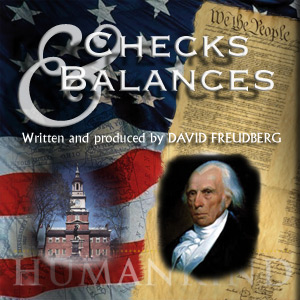A FREE PRESS
 “Freedom of the press is guaranteed only to those who own one.”
“Freedom of the press is guaranteed only to those who own one.”
A.J. LIEBLING
 “Freedom of the press is not an end in itself but a means to the end of achieving a free society.”
“Freedom of the press is not an end in itself but a means to the end of achieving a free society.”
FELIX FRANKFURTER, former U.S. Supreme Court Justice
“The right of freely examining public characters and measures and of free communication among the people thereon… has ever been justly deemed the only effectual guardian of every other right.”
JAMES MADISON, Founder and former President of the United States
“The right of electing the members of the government constitutes more particularly the essence of a free and responsible government. The value and efficacy of this right depends on the knowledge of the comparative merits and demerits of the candidates for public trust, and on the equal freedom, consequently, of examining and discussing these merits and demerits of the candidates respectively.”
JAMES MADISON, Founder and former President of the United States
“The news media, collectively, are often unpopular. Long-term trends of the Gallup Polls’ Honesty and Ethics Survey reveal a growing skepticism among the American public regarding the ethics of news media professionals. The November 2000 edition reports that the three news professions surveyed all remain significantly lower than when they were first placed on the list. Twenty-one percent of the public says journalists are honest and ethical, a percentage that has declined steadily from its debut of 33% in 1977. Two specific news professions that first appeared on the list in 1981, TV reporting and newspaper reporting, have also dipped significantly. Currently, 21% of the public rates TV reporters as having high ethical standards; down steadily from the 36% they received in 1981. Similarly, just 16% of the public gives newspaper reporters very high or high ethical ratings. Again, this percentage has decreased consistently since 1981, when it was 30% (Carlson, 2000: on-line).
KENT P. CASSELLA, Major, United States Army
“In the United States, the government may not prevent the publication of a newspaper, even when there is reason to believe that it is about to reveal information that will endanger our national security. By the same token, the government cannot:
- Pass a law that requires newspapers to publish information against their will.
- Impose criminal penalties, or civil damages, on the publication of truthful information about a matter of public concern or even on the dissemination of false and damaging information about a public person except in rare instances.
- Impose taxes on the press that it does not levy on other businesses.
- Compel journalists to reveal, in most circumstances, the identities of their sources.
- Prohibit the press from attending judicial proceedings and thereafter informing the public about them.
 Collectively, this bundle of rights, largely developed by U.S. Supreme Court decisions, defines the “freedom of the press” guaranteed by the First Amendment. What we mean by the freedom of the press is, in fact, an evolving concept. It is a concept that is informed by the perceptions of those who crafted the press clause in an era of pamphlets, political tracts and periodical newspapers, and by the views of Supreme Court justices who have interpreted that clause over the past two centuries in a world of daily newspapers, books, magazines, motion pictures, radio and television broadcasts, and now Web sites and Internet postings.
Collectively, this bundle of rights, largely developed by U.S. Supreme Court decisions, defines the “freedom of the press” guaranteed by the First Amendment. What we mean by the freedom of the press is, in fact, an evolving concept. It is a concept that is informed by the perceptions of those who crafted the press clause in an era of pamphlets, political tracts and periodical newspapers, and by the views of Supreme Court justices who have interpreted that clause over the past two centuries in a world of daily newspapers, books, magazines, motion pictures, radio and television broadcasts, and now Web sites and Internet postings.
LEE LEVINE, Esq., Levine, Sullivan & Koch
LOBBYING
Excerpted from Lobbying FAQ prepared by the Center for Public Integrity, Washington DC:
By Elizabeth Brown
January 18, 2006
Lobbying has been present throughout our nation’s history, dating back to America’s first Congress, when New York merchants offered lawmakers treats and dinners in an attempt to delay passage of a tariff bill. Yet for a practice so politically prevalent, surprisingly little is known about the lobbying industry.
What is lobbying?
Federal statute defines lobbying as any communication made on behalf of a client to members of Congress, congressional staffers, the president, White House staff and high-level employees of nearly 200 agencies, regarding the formulation, modification, or adoption of legislation.
Who is a lobbyist?
A lobbyist is a person hired directly by an organization or through a firm for services that include making more than one “lobbying contact” on behalf of a client, and who spends at least 20 percent of his or her time during a six-month period engaged in lobbying activity.
According to the Center for Public Integrity more than 22,000 companies and organizations have employed 3,500 lobbying firms and more than 27,000 lobbyists since 1998.
Who lobbies?
Corporations, organizations, much of the Fortune 500, universities, environmental and non-profit groups, and even churches lobby the federal government.
According to the Center for Public Integrity, the most commonly lobbied issue is budget and appropriations.
Who regulates lobbying?
The Secretary of the Senate and the Clerk of the House of Representatives oversee federal lobbying. According to the Lobbying Disclosure Act of 1995, those offices are charged with providing guidance on lobbying disclosure, ensuring the timeliness and accuracy of required reports, and making those reports available to the public.
According to a Center for Public Integrity report, nearly 14,000 documents that should have been filed periodically with the Senate Office of Public Records are missing.
Forty-nine out of the top 50 lobbying firms failed to file required forms during the last six years.
Who must register to lobby with the federal government?
Organizations that employ lobbyists in house must register with Congress if their lobbying expenditures exceed $24,500 during a six-month period. Lobbying firms must file a separate registration — at least 45 days after first contact — for each client whose lobbying billings exceed $6,000 for a six-month period.
Can a former member of Congress, legislative staff or senior executive branch staff lobby on the Hill (revolving door)?
Government ethics law prohibits former members of Congress, senior legislative staff and senior executive branch staff from lobbying their former department or agency for one year after leaving government. These officials must report their past positions on their lobbying registration forms for the first two years after leaving government.
Former members of Congress retain access to the members-only dining facilities, gymnasiums, cloakrooms and the chamber floorsareas not accessible to others. According to a Center for Public Integrity report, more than 2,200 former federal employees, including 273 former White House staffers, and nearly 250 former members of Congress and agency heads have registered as federal lobbyists between 1998 and 2004.
Can relatives of members of Congress work as lobbyists?
Relatives of members of Congress can and do register to lobby.
CIVIL LIBERTIES IN TIME OF WAR
 “This is … a different era, a different war… we’ve got to be able to detect and prevent,” he said. “And … I just want to assure the American people that … I’ve got the authority to do this …”
“This is … a different era, a different war… we’ve got to be able to detect and prevent,” he said. “And … I just want to assure the American people that … I’ve got the authority to do this …”
PRESIDENT GEORGE W. BUSH on why he circumvented existing procedures that allow surveillance only with a secret court order.
 “We will not tolerate a president who believes that he is the sole decision-maker when it comes to the policies that this country should have in the war against terror and the policies we should have to protect the rights of completely innocent Americans…He is the president, not a king.”
“We will not tolerate a president who believes that he is the sole decision-maker when it comes to the policies that this country should have in the war against terror and the policies we should have to protect the rights of completely innocent Americans…He is the president, not a king.”
SENATOR RUSS FEINGOLD, Wisconsin (D)
Excerpted from a review by the Center for American Progress (Washington, DC) of legal considerations regarding the National Security Agency wiretap program as revealed in December 2005 by The New York Times:
Based on the facts available to date, the wiretap program appears to be clearly illegal.
1. Wiretaps by federal officials are generally prohibited, unless there is a particular legal basis such as a court order. The “exclusive basis” for wiretaps is either Title III for criminal investigations or the Foreign Intelligence Surveillance Act (FISA) for foreign intelligence investigations. It is a crime to conduct wiretaps unless there is a “statutory basis” for doing so.
2. The Administration has given two, and only two, reasons why it says the criminal law does not apply to the program.
3. The first is the Authorization of Use of Military Force (AUMF), passed on September 13, 2001. For multiple reasons, the AUMF does not provide a legal basis for the NSA wiretap program.
4. The second is that the President has inherent authority that does not derive from statutes. The President indeed has important inherent authority as leader of the Executive Branch and Commander-in-Chief, but the current Administration has taken that position to unprecedented lengths. We have a system of checks and balances. As the Supreme Court has made clear, the President’s power is at its “lowest ebb” when his actions directly contradict a lawful statute, as they do here.
5. In addition, as we learn more facts about the program, there may well be a clear case that government actions have violated the Fourth Amendment rules against unreasonable searches and seizures.
6. In short, it is a crime to conduct wiretaps in the United States, of U.S. citizens, unless there is a statutory basis for doing so. There was no statutory basis here.
Excerpted from a review by the American Civil Liberties Union (New York, NY) of the USA Patriot Act:
The Patriot Act increases the governments surveillance powers in four areas:
- Records searches. It expands the government’s ability to look at records on an individual’s activity being held by third parties. (Section 215)
- Secret searches. It expands the government’s ability to search private property without notice to the owner. (Section 213)
- Intelligence searches. It expands a narrow exception to the Fourth Amendment that had been created for the collection of foreign intelligence information (Section 218).
- “Trap and trace” searches. It expands another Fourth Amendment exception for spying that collects “addressing” information about the origin and destination of communications, as opposed to the content (Section 214).
1. Expanded access to personal records held by third parties
One of the most significant provisions of the Patriot Act makes it far easier for the authorities to gain access to records of citizens’ activities being held by a third party. At a time when computerization is leading to the creation of more and more such records, Section 215 of the Patriot Act allows the FBI to force anyone at all – including doctors, libraries, bookstores, universities, and Internet service providers – to turn over records on their clients or customers.
2. More secret searches
For centuries, common law has required that the government can’t go into your property without telling you, and must therefore give you notice before it executes a search. That “knock and announce” principle has long been recognized as a part of the Fourth Amendment to the Constitution.
The Patriot Act, however, unconstitutionally amends the Federal Rules of Criminal Procedure to allow the government to conduct searches without notifying the subjects, at least until long after the search has been executed. This means that the government can enter a house, apartment or office with a search warrant when the occupants are away, search through their property, take photographs, and in some cases even seize property – and not tell them until later.
Notice is a crucial check on the government’s power because it forces the authorities to operate in the open, and allows the subject of searches to protect their Fourth Amendment rights. For example, it allows them to point out irregularities in a warrant, such as the fact that the police are at the wrong address, or that the scope of the warrant is being exceeded (for example, by rifling through dresser drawers in a search for a stolen car). Search warrants often contain limits on what may be searched, but when the searching officers have complete and unsupervised discretion over a search, a property owner cannot defend his or her rights.
Finally, this new “sneak and peek” power can be applied as part of normal criminal investigations; it has nothing to do with fighting terrorism or collecting foreign intelligence.
3. Expansion of the intelligence exception in wiretap law
Under the Patriot Act, the FBI can secretly conduct a physical search or wiretap on American citizens to obtain evidence of crime without proving probable cause, as the Fourth Amendment explicitly requires.
A 1978 law called the Foreign Intelligence Surveillance Act (FISA) created an exception to the Fourth Amendment’s requirement for probable cause when the purpose of a wiretap or search was to gather foreign intelligence. The rationale was that since the search was not conducted for the purpose of gathering evidence to put someone on trial, the standards could be loosened. In a stark demonstration of why it can be dangerous to create exceptions to fundamental rights, however, the Patriot Act expanded this once-narrow exception to cover wiretaps and searches that DO collect evidence for regular domestic criminal cases. FISA previously allowed searches only if the primary purpose was to gather foreign intelligence. But the Patriot Act changes the law to allow searches when “a significant purpose” is intelligence. That lets the government circumvent the Constitution’s probable cause requirement even when its main goal is ordinary law enforcement.
4. Expansion of the “pen register” exception in wiretap law
Another exception to the normal requirement for probable cause in wiretap law is also expanded by the Patriot Act. Years ago, when the law governing telephone wiretaps was written, a distinction was created between two types of surveillance. The first allows surveillance of the content or meaning of a communication, and the second only allows monitoring of the transactional or addressing information attached to a communication. It is like the difference between reading the address printed on the outside of a letter, and reading the letter inside, or listening to a phone conversation and merely recording the phone numbers dialed and received.
Wiretaps limited to transactional or addressing information are known as “Pen register/trap and trace” searches (for the devices that were used on telephones to collect telephone numbers). The requirements for getting a PR/TT warrant are essentially non-existent: the FBI need not show probable cause or even reasonable suspicion of criminal activity. It must only certify to a judge – without having to prove it – that such a warrant would be “relevant” to an ongoing criminal investigation. And the judge does not even have the authority to reject the application. ![]()

